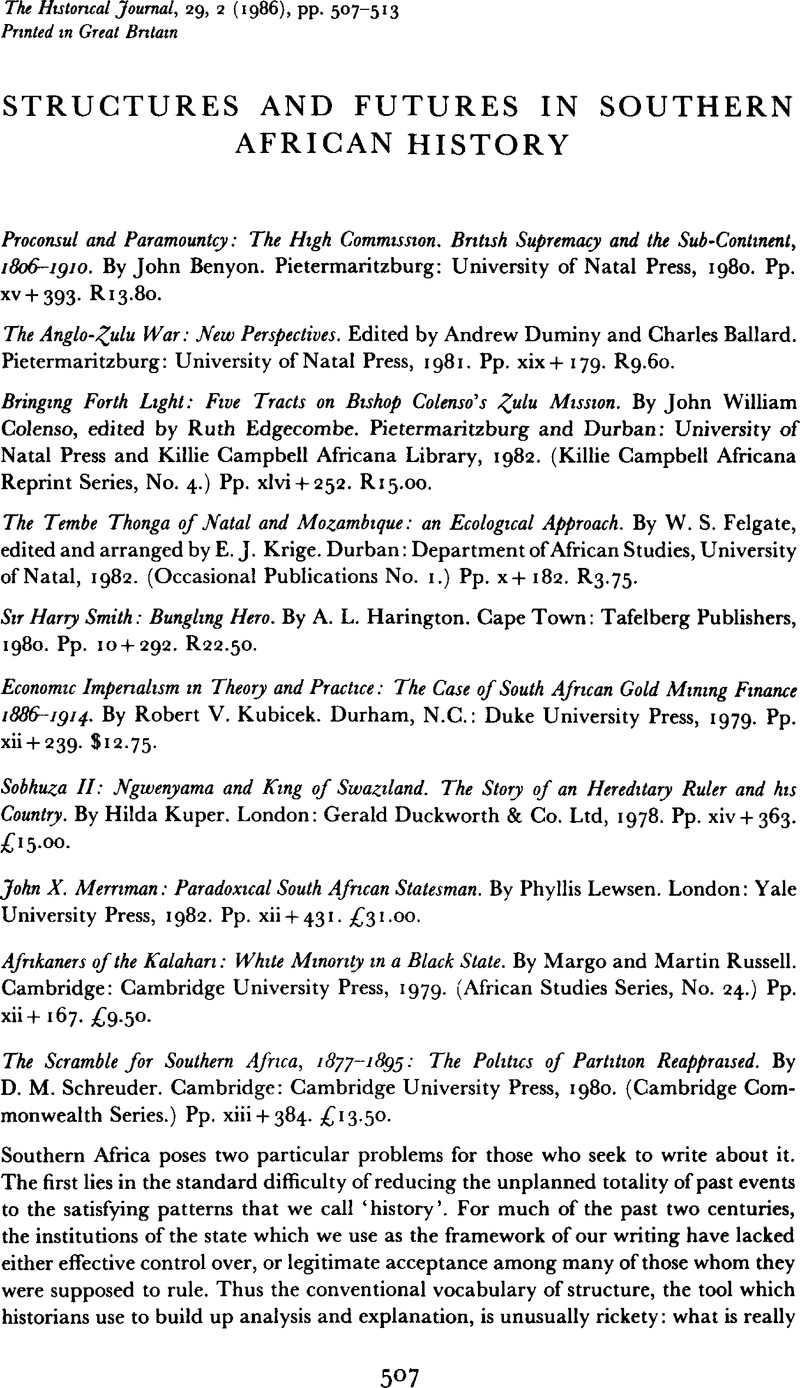No CrossRef data available.
Article contents
Structures and Futures in Southern African History
Published online by Cambridge University Press: 11 February 2009
Abstract

- Type
- Review Articles
- Information
- Copyright
- Copyright © Cambridge University Press 1986
References
1 Herman Giliomee and Richard Elphick also invoke the word ‘structure’ to describe the evolution of social relationships in the Cape Colony. ‘The structure of European domination at the Cape, 1652–1820’. in Elphick, R. and Giliomee, H. (eds.). The shaping of southern African society, 1652–1820 (Cape Town and London, 1979), pp. 359–90Google Scholar.
2 Bryce, James, Impressions of South Africa (London, 1899 ed.). p. 465Google Scholar.
3 ‘Tomorrow is another day’ and ‘All shall come right’. Winston Churchill learned the second phrase from M. T. Steyn of the Orange Free State, and frequently used it in the dark days of 1940.
4 Smuts to Merriman, quoted in Hancock, W. K., Smuts: the sanguine years 1870–1919 (Cambridge, 1962), p. 221Google Scholar.
5 Keppel-Jones, Arthur, When Smuts goes: a history of South Africa from 1952 to 2010 (London, 1947)Google Scholar; Macdonald, Tom, Jan Hofmeyr: heir to Smuts (London, 1948)Google Scholar.
6 Hence the significance of such debates as Johnson, R. W., How long will South Africa survive? (London, 1977)CrossRefGoogle Scholar and Gamm, L. H. and Duignan, Peter, Why South Africa will survive (London, 1981)Google Scholar.
7 Lehmann, J. H., Remember you are an Englishman: a biography of Sir Harry Smith 1787–1860 (London, 1977)Google Scholar.
8 Etherington, N. A., ‘Anglo-Zulu relations, 1856–1878’, in Duminy, Andrew and Ballard, Charles (eds.), The Anglo-Zulu War: new perspectives (Pietermaritzburg, 1981), pp. 13–52Google Scholar.
9 Compare Webb, C. de B., ‘The origins of the war: problems of interpretation’, pp. 1–12Google Scholar with his ‘Lines of power: the High Commissioner, the telegraph and the war of 1879’, Natalia, VIII (1978). 31–7Google Scholar.
10 Lewsen, Phyllis (ed.), Selections from the correspondence of J. X. Merriman 1870–1890 (Van Riebeeck Society, no. 41, Cape Town, 1960)Google Scholar; …1890–1898 (no. 44, 1963); …1890–1905 (no. 47, 1966); …1905–1924 (no. 50, 1969).
11 Gooch, G. P., Life of Lord Courtney (London, 1920)Google Scholar.
12 Duminy, and Ballard, (eds.), The Anglo-Zulu War, p. xixGoogle Scholar.
13 Trollope, Anthony, South Africa, ed. Davidson, J. H. (Cape Town, 1973), p. 454Google Scholar.


